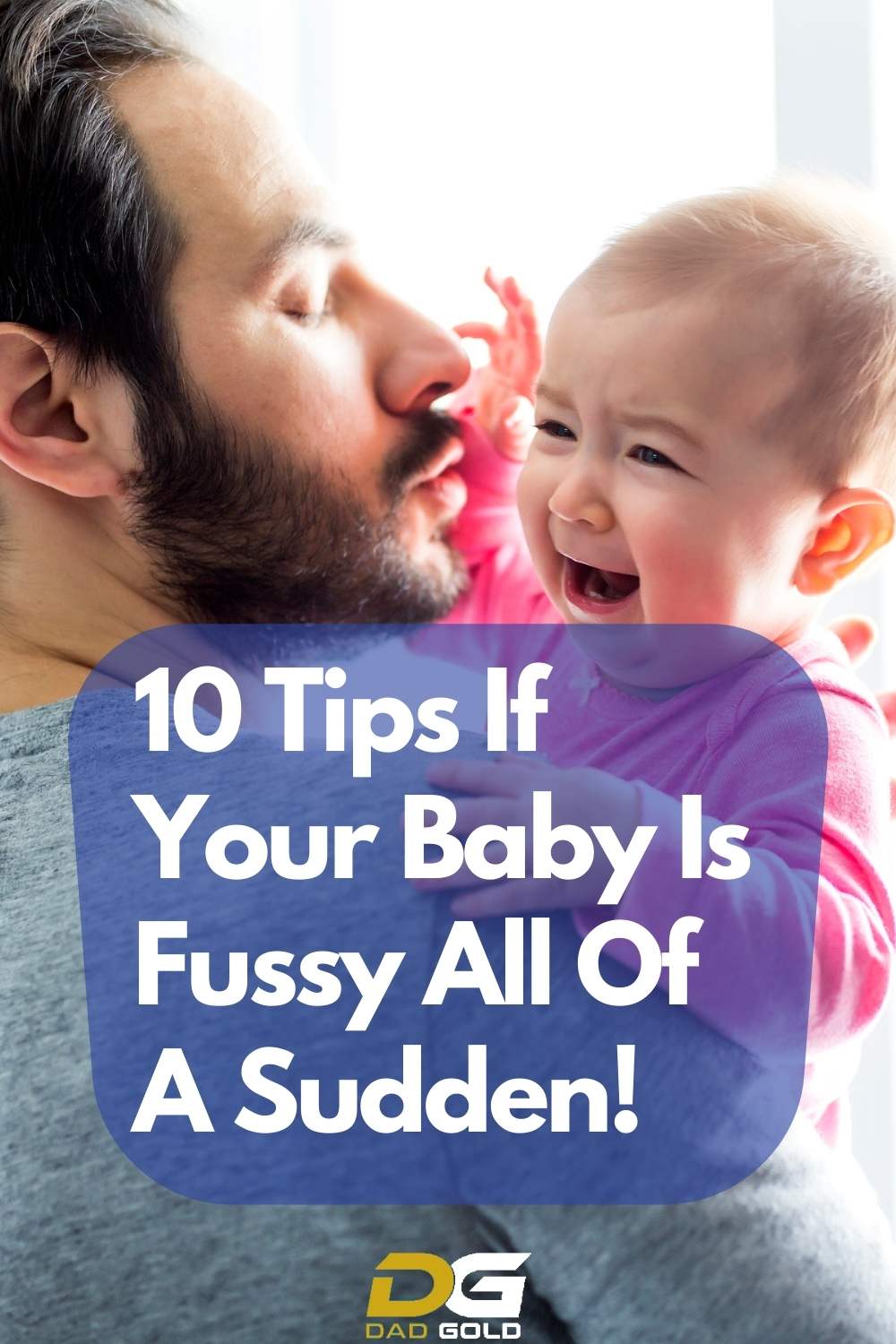Crying is the only way for your baby to communicate with you and get their needs met. Babies cry for many reasons, and you thought responding to their cues will make them all playful and happy again.
But what if your baby cries inconsolably for no apparent reason and you can’t think of anything to fix that?
Now your mind is plagued with nagging questions. Are they in pain? Hungry again? Have an infection? Did you do something wrong?
You start to spiral and get utterly frustrated (understandably so) when nothing works to comfort your child.
Guess what? Things are going to get better because, in this article, you’ll find everything you need to know about infant fussiness- from the reasons why babies get fussy all of a sudden to the strategies to deal with it.
Read on.

Reasons Why Your Baby Is So Fussy
Let’s start with the basics. Babies usually get fussy and irritable when they’re:
-

Bold Male Pride – Baseball Trucker Cap Celebrating Masculinity
£18.00 Select options This product has multiple variants. The options may be chosen on the product page -

Dad Bod Appreciation Gift Mug
£14.00 Add to cart -

Dad Bod, Bad Jokes Structured Baseball Cap
£22.00 Select options This product has multiple variants. The options may be chosen on the product page
- Hungry
- Sleepy or overtired
- Sick
- Running a fever after vaccination.
- Feeling hot or cold
- In diaper need
- Uncomfortable for some reason
- Bored
- Feeling lonely and wants to be held
- Suffering from abdominal pain or gas
- Not getting enough milk/ having foremilk-hindmilk imbalance.
If you have taken care of all of these needs and still have a cranky child, it might be caused by the following reasons:
Growth Spurts
Babies tend to experience frequent developmental leaps during their first year. The fussiness that’s driving you insane is one of the signs of your baby’s growth spurt. Babies usually go through their first infant growth spurt anytime between 1 and 3 weeks.
They get ravenous and will be feeding every hour. They’ll also have a messed-up sleep schedule. They may experience another spurt between 4 and 6 weeks. After that, 3 more growth spurts might happen every 3 months until they’re 1-year-old.
These spurts are normal development milestones and usually don’t last more than 3 to 4 days.
Colic
Colic might be another reason behind your baby’s non-stop crying. Many babies get fussy and continue crying even when they aren’t hungry or sick. They can’t be comforted and keep crying without any apparent reason for hours.
If your baby’s healthy and well-fed, yet they won’t stop crying for more than 3 hours, you might have a colicky baby. About 20% of babies develop colic around 2 weeks of age, and their fussiness gets worst between 4 and 6 weeks of age.
Yous fussy baby might grow out of colic by the time they’re 3-4 months old. For some babies, though, colic might last until they’re 6-month-old.
Teething
Teething begins when your child’s around 4-6 months old, and fussiness is one of the most common teething symptoms. Your child will have swollen gums and will get very fussy while drooling all the time. They’ll be trying to gnaw on anything they find around them.
Babies may experience sleep disruption during teething and will cry a lot at night. They’ll become more clingy and fussy throughout the day.
10 Things You Can Do To Help Your Fussy Baby?

You’ve already tried breastfeeding and burping. Changed the diapers. Did everything to soothe your fussy baby, but nothing seems to work. Well, let’s try a few other techniques to comfort your little one then.
If your baby being fussy is down to lack of sleep (we know how that feels, don’t we?), then you should check out The Baby Sleep Method by trained Psychologist Mary-Ann Schuler.
Just remember that no two babies are the same, and you’ll have to keep trying different calming techniques until you figure out what works for your baby.
1. Make a Baby Burrito
Swaddling your baby like a little burrito is a good way to promote warmth and comfort to fussy babies.
It makes them feel secure while they learn to adjust to life outside the womb and helps them to calm down.
2. Hold Them
Contrary to the popular myth, you aren’t really spoiling your baby when you’re responding to their cues every time they need you.
Rather, by trying to comfort them while holding them in your arms, you’re making them feel safe.
3. Show Some Tender Loving Care
If your child needs a little more extra love and care to calm down, give them a back rub and a gentle massage.
Please give them a warm birth afterward. Try laying them down on their tummy and pat their back. This will help with any digestive discomfort too.
4. Rock Them
Carry your baby in a sling or baby carrier and rock them back and forth. Walk around the house as you bounce them or get a vibrating baby bouncer/swing.
You’ll see your fussy baby is suddenly calm and relaxed because being rocked like that reminds babies of their time in the womb.
5. Go for a Car Ride
What does a car ride have to do with fussiness, you ask? Studies have shown that the rocking motion and vibration of the car, along with the white noise coming from the engine, recreate a womb-like environment for the babies.
It has a calming effect and helps them to relax. I’ve used it so many times in the past!
6. Play Calming Sounds
Use a white-noise machine or install a free noise app for your phone. You can also turn on the fan or vacuum cleaner.
Try shushing, singing, and playing your favorite songs and see if the baby’s got your taste in music! It might just work.
7. Offer something to suck on
Sucking has a calming effect on infant fussiness. If you’re not breastfeeding, pacifiers should work too.
The American Academy of Pediatrics (AAP) says it’s excellent for a newborn to suck onto a pacifier, and it won’t negatively impact their growth and development.
8. Change the Diet
If your child is breastfed, opt for healthy foods that increase breast milk production if a low milk supply causes fussiness.
Try avoiding spicy foods, caffeine, dairy, and onions for a while to see if that helps. For formula-fed babies, trying a different formula might be a good idea.
9. Reduce Stimulation
Removing distractions can help an overstimulated baby to calm down. Dim the lights, turn down the music and turn off the television.
Then make their room dark and quiet. You can talk to them in a calming voice to let them know you’re there.
You could also try using a night light projector to settle your baby.
10. Make Them Comfortable
Check the temperature of your baby’s room and make sure to dress them in comfy clothes. Keep the temperature between 68-72 degrees Fahrenheit (20 to 22.2 degrees Celsius) to not feel too hot or too cold.
Also, don’t overfeed your baby thinking it’d help with the fussiness.
When should I be concerned about my baby being fussy?

It’s normal for a typical baby to cry about 2-3 hours a day for the first few months. Normal infant fussiness usually starts when babies are 1 week to 3 weeks old and typically peaks between 6 and 8 weeks. It often happens during the late afternoon and evenings.
Luckily it goes away when they are about 3-4 months old. If no soothing technique seems to be much of a help and your baby still cries intensely for hours, it might be a good idea to see a doctor.
The doctor can tell you if the excessive crying is caused by colic, gas, stomach aches, or ear infection.
Whilst crying is very common for a baby, you should always follow your instincts and speak to a doctor if you are concerned!
If there’s no medical cause for the fussiness, your little one will naturally grow out of it as they get older.
Conclusion
Slowly but surely, your little one will begin to feel secure and comfortable around you. It might take some time to find the perfect solution for your baby. But hang in there. The fussiness will subside, and your crybaby will turn out just fine.
Until that happens, remember that you’re doing great, and it’s okay to ask your partner, friends, and family for help.
Good luck!



